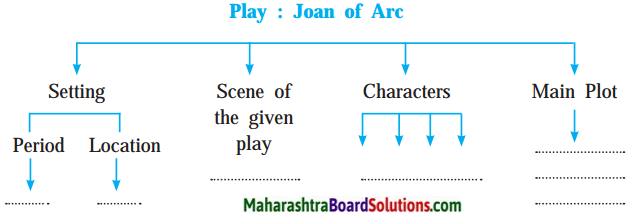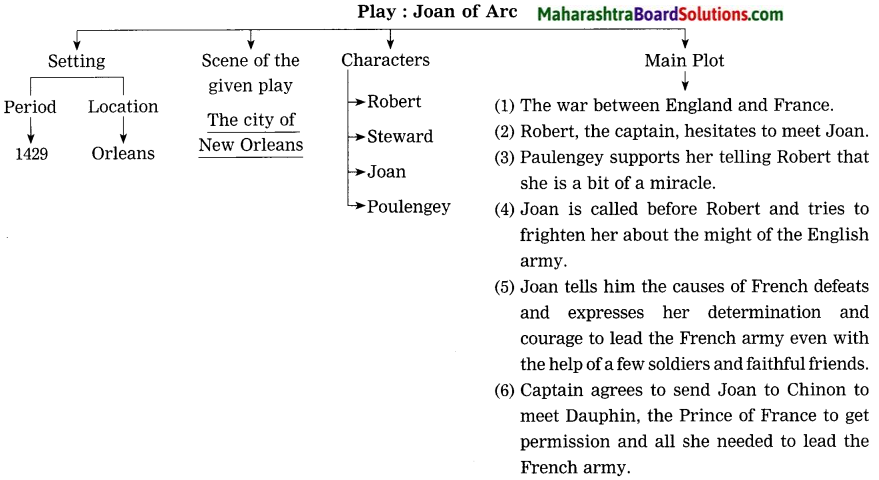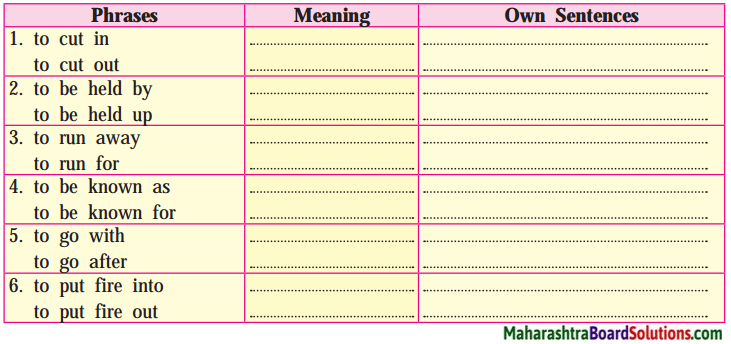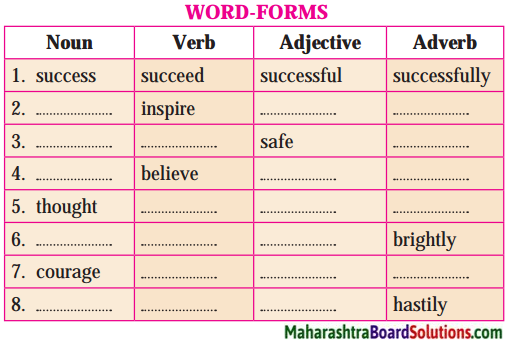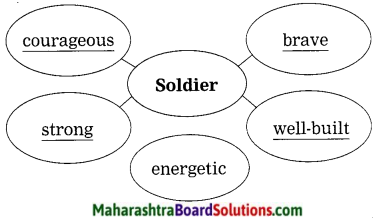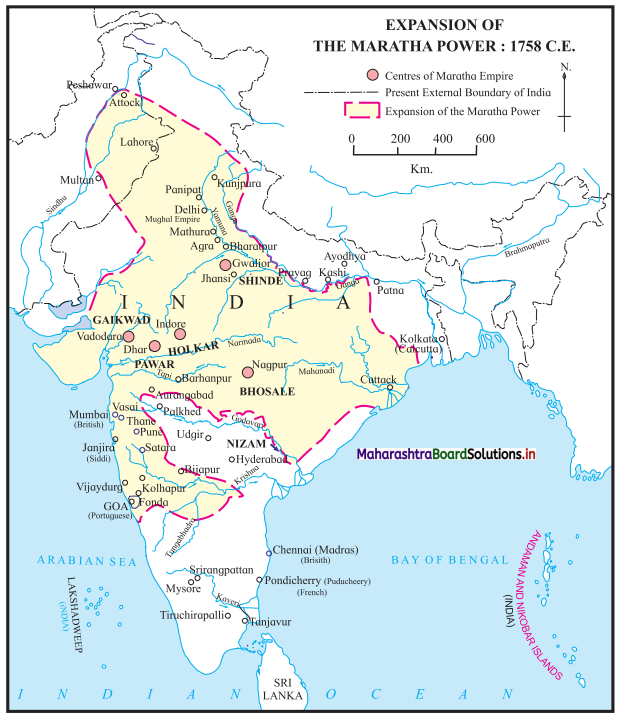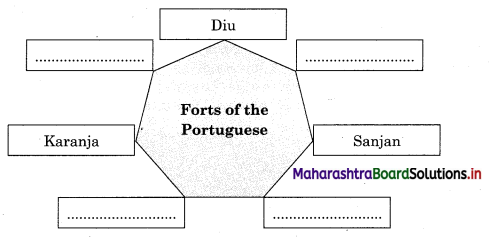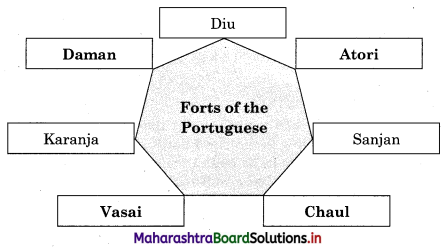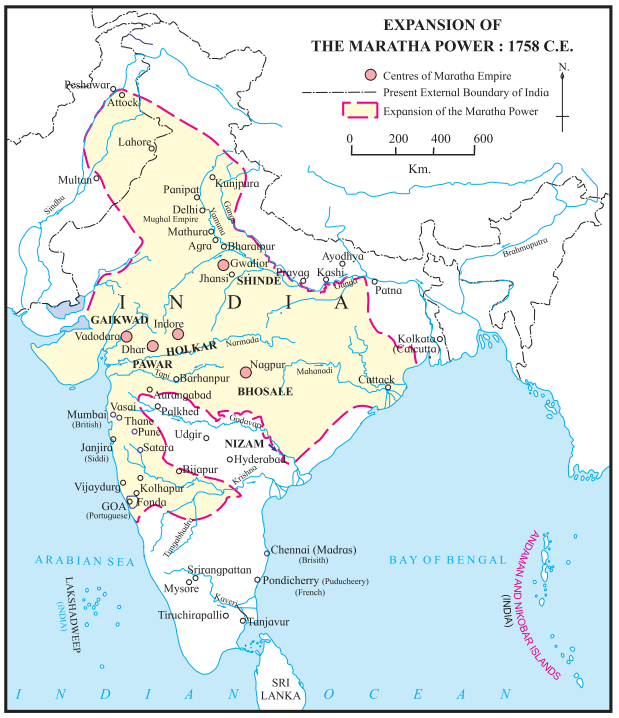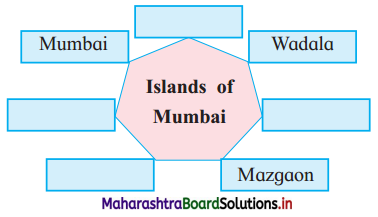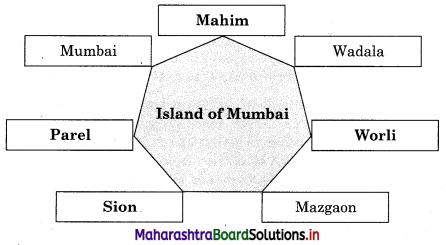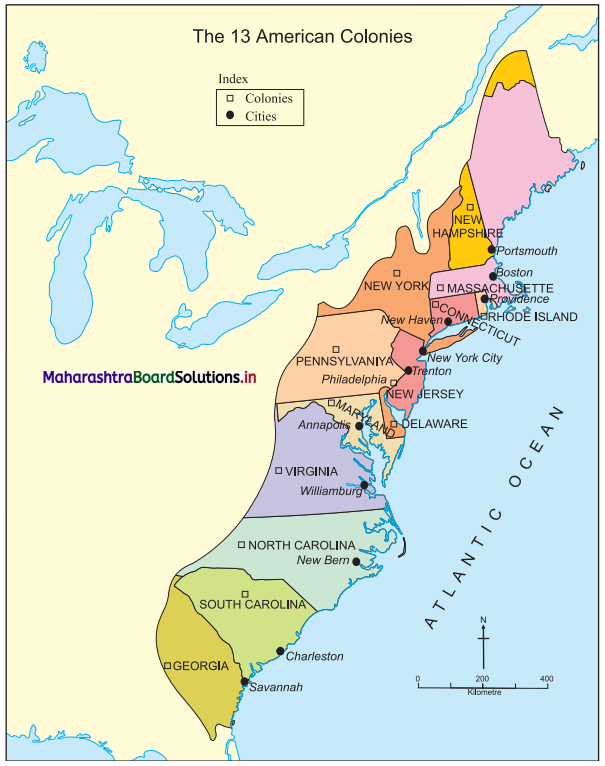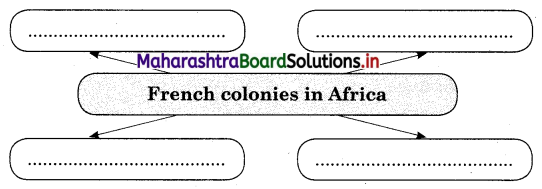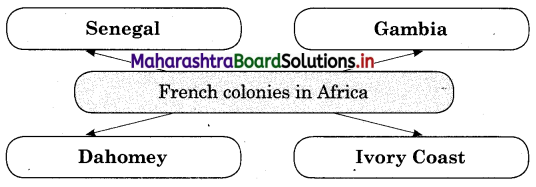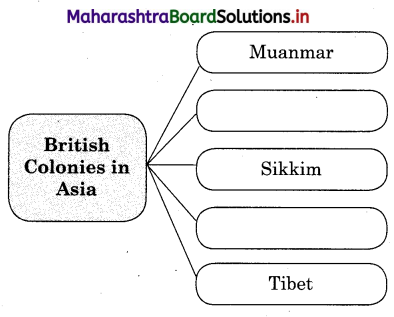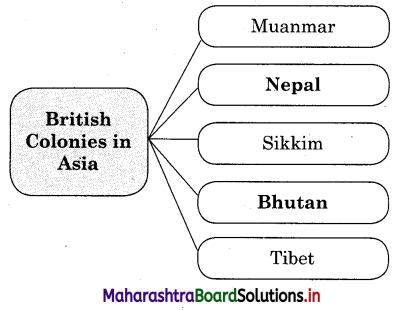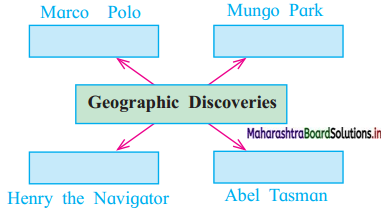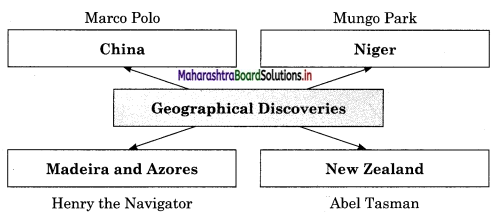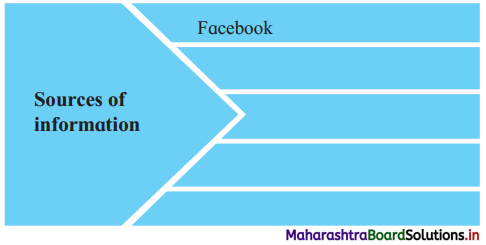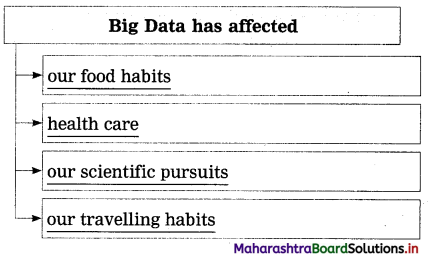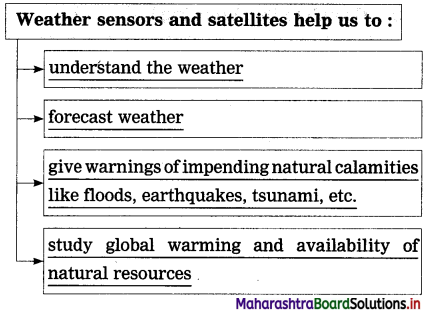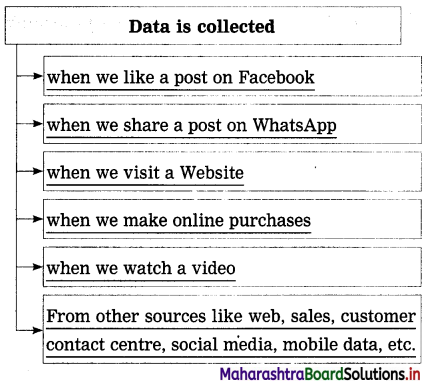Balbharti Maharashtra State Board Class 12 History Important Questions Chapter 6 Indian Struggle against Colonialism Important Questions and Answers.
Maharashtra State Board 12th History Important Questions Chapter 6 Indian Struggle against Colonialism
1A. Choose the correct alternative and rewrite the statement.
Question 1.
The British East India Company took charge of Khandesh in the year _________
(a) 1816
(b) 1817
(c) 1818
(d) 1819
Answer:
(c) 1818
Question 2.
_________ blocked all supplies coming to the Bhils.
(a) Captain Robinson
(b) Captain Taylor
(c) Captain Evans
(d) Captain Briggs
Answer:
(d) Captain Briggs
![]()
Question 3.
In Satara district the Ramoshi community revolted under the leadership of _________
(a) Chitur Singh
(b) Umaji Naik
(c) Santaji Naik
(d) Hansaji Naik
Answer:
(a) Chitur Singh
Question 4.
_________ seized the government treasury at Bhamburde.
(a) Bhujba
(b) Santaji Naik
(c) Yesaji
(d) Umaji Naik
Answer:
(d) Umaji Naik
Question 5.
In Kolhapur state, the keeper of forts was called _________
(a) Gadkari
(b) Ramoshi
(c) Kamgar
(d) Kadam
Answer:
(a) Gadkari
Question 6.
_________ adopted the policy of Doctrine of Lapse.
(a) Lord Wellesley
(b) Lord Dalhousie
(c) Lord Ripon
(d) Lord Lytton
Answer:
(b) Lord Dalhousie
![]()
Question 7.
_________ was reinstated as the ruling emperor of India.
(a) Aurangzeb
(b) Shahjahan
(c) Bahadur Shah
(d) Bakht Khan
Answer:
(c) Bahadur Shah
Question 8.
_________ was the queen of Jhansi.
(a) Saraswatibai
(b) Lakshmibai
(c) Radhabai
(d) Parvatibai
Answer:
(b) Lakshmibai
Question 9.
The Madras Mahajan Sabha was established in _________
(a) 1884
(b) 1885
(c) 1886
(d) 1887
Answer:
(a) 1884
Question 10.
_________ was the founder of the Indian National Congress.
(a) Dadabhai Nowrojee
(b) Allan Octavian Hume
(c) Mrs. Annie Besant
(d) George Thompson
Answer:
(b) Allan Octavian Hume
Question 11.
_________ published a poem called ‘Shivajiche Udgar’.
(a) Mahratta
(b) Darpan
(c) Kesari
(d) Young India
Answer:
(c) Kesari
![]()
Question 12.
Shyamji Krishna Verma founded _________ in London.
(a) India House
(b) Burma House
(c) Male House
(d) London House
Answer:
(a) India House
1B. Find the incorrect pair from group ‘B’ and write the corrected one.
Question 1.
| Group ‘A’ | Group ‘B’ |
| (a) Dwarakanath Tagore | Land Holder’s Association |
| (b) William Adams | British India Society |
| (c) Surendranath Banerjee | Indian Association |
| (d) George Thompson | Madras Native |
Answer:
George Thompson – Bengal British India Society
Question 2.
| Group ‘A’ | Group ‘B’ |
| (a) Mitra Mela | Vinayak Damodar Savarkar |
| (b) Anusheelan Samiti | Rasbihari Bose |
| (c) Gadar | Lala Hardayal |
| (d) Hindustan Republican Association | Ashfaqulla |
Answer:
Anusheelan Samiti – Aurohindo Cohosh
Question 3.
| Group ‘A’ | Group ‘B’ |
| (a) Champaranya Satyagraha | 1917 |
| (b) Rowlatt Act | 1918 |
| (c) Non-Co-operation Movement | 1920 |
| (d) Dandi March | 1930 |
Answer:
Rowlatt Act – 1919
Question 4.
| Group ‘A’ | Group ‘B’ |
| (a) Sucheta Kripalani | Dadi |
| (b) Aruna Asaf Ali | Kusum |
| (c) Ram Manohar Lohia | Doctor |
| (d) S.M. Joshi | Imam Ali |
Answer:
Aruna Asaf Ali – Kadam
2A. Write the names of historical places/persons/events.
Question 1.
The state took over by the British from the Bhosale of Nagpur in 1803 –
Answer:
Odisha
Question 2.
Keeper of forts –
Answer:
Gadkari
![]()
Question 3.
The British Commander-in-Chief who defeated Tatya Tope –
Answer:
Sir Colin Campbell
Question 4.
A proclamation issued by Queen Victoria –
Answer:
Queen’s Proclamation
Question 5.
Venue of the first session of the Indian National Congress –
Answer:
Mumbai
Question 6.
Founder of the Indian National Congress –
Answer:
Allan Octavian Hume
Question 7.
Year in which the Vernacular Press Act was implemented –
Answer:
1878
Question 8.
Partition of Bengal was planned by –
Answer:
Lord Curzon
Question 9.
The policy of Lokmanya Tilak was known as –
Answer:
Responsive Co-operation
Question 10.
Author of ‘1857 – The First War of Independence –
Answer:
Vinayak Damodar Savarkar
Question 11.
Indian spinning wheel –
Answer:
Charkha
![]()
Question 12.
The mantra is given by Gandhiji –
Answer:
Do or Die
Question 13.
Pseudonym took by Achyutrao Patwardhan –
Answer:
Kusum
Question 14.
The Constitution of India was implemented on –
Answer:
26th January 1950
2B. Choose the correct reason from those given below and complete the sentence.
Question 1.
The Sawantwadi aristocracy got together and revolted against the British because _________
(a) they were angered by the British policies
(b) the British were interfering in their internal affairs
(c) the British had taken over their territories
(d) the Sawantwadi aristocracy wanted to be free
Answer:
(a) they were angered by the British policies
Question 2.
The freedom struggle of1857 was the result of mounting pressures because of _________
(a) increasing discontent of Indian soldiers in the British army
(b) political and social reasons
(c) religious and economic reasons
(d) All of the above reasons
Answer:
(d) All of the above reasons
Question 3.
The Doctrine of Lapse was adopted by Lord Dalhousie because _________
(a) the British wanted to annex all the princely states which did not have a rightful heir
(b) the British wanted money from all the princely states
(c) the British did not like the princes
(d) the British considered themselves superior
Answer:
(a) the British wanted to annex all the princely states which did not have a rightful heir
![]()
Question 4.
In 1839, William Adams established ‘British India Society’ in London _________
(a) to acquaint the British citizens in England with the culture of India
(b) to acquaint the British citizens in England with the conditions in British India
(c) to acquaint the British citizens in England with the clothes of India
(d) to acquaint the British citizens in England with the diet of India
Answer:
(b) to acquaint the British citizens in England with the conditions in British India
Question 5.
Gandhiji led the Salt Satyagraha in Gujarat because _________
(a) salt was very expensive
(b) salt that was sold in the market was of poor quality
(c) the British government had levied a heavy tax on salt, an essential commodity in daily life
(d) the British government had stopped the sale of salt
Answer:
(c) the British government had levied a heavy tax on salt, an essential commodity in daily life
3A. Observe the map on textbook page 44 and answer the questions based on it.
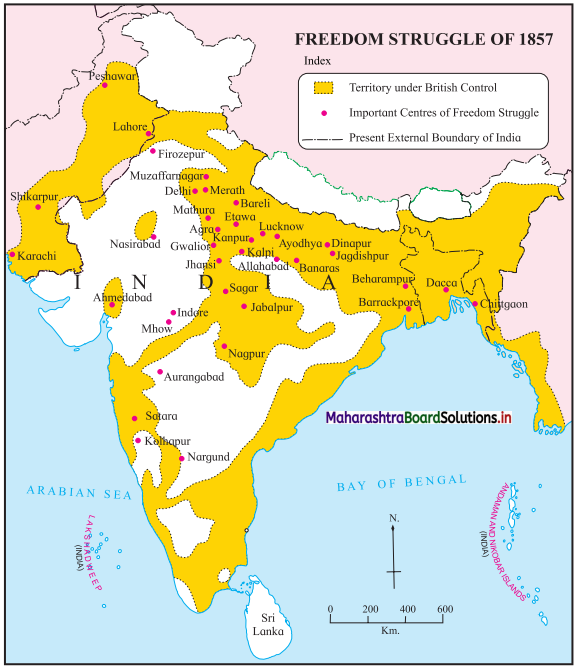
Question 1.
Name some territories that were under British control.
Answer:
Nagpur, Satara, Jabalpur, Jhansi, Karachi etc.
Question 2.
Name some important centers of freedom struggle.
Answer:
Aurangabad, Kolhapur, Delhi, Agra etc.
Question 3.
Name the islands that lie in the Bay of Bengal.
Answer:
Andaman and Nicobar Islands lie in the Bay of Bengal.
![]()
Question 4.
Where are the Lakshadweep Islands located?
Answer:
The Lakshadweep Islands are located in the Arabian Sea.
3B. Complete the following concept map.
Question 1.
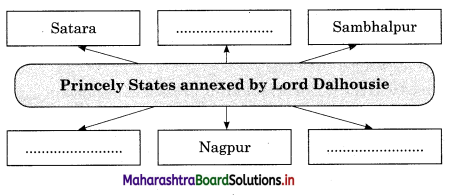
Answer:
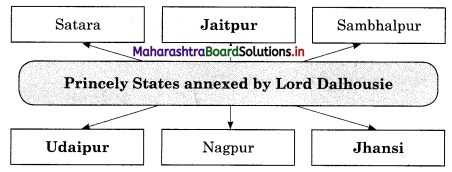
Question 2.
| Leaders | Assumed Pseudonyms |
| 1. Sucheta Kriplani | ……………………………….. |
| 2. …………………………….. | Kusum |
| 3. Ram Manohar Lohia | ……………………………….. |
| 4. ……………………………. | Sushila, Satya |
| 5. Baba Raghavdas | ………………………………. |
| 6. …………………………… | Kadam |
| 7. S.M. Joshi | ………………………………. |
Answer:
| Leaders | Assumed Pseudonyms |
| 1. Sucheta Kriplani | Dadi/Bahanji |
| 2. Achyutrao Patwardhan | Kusum |
| 3. Ram Manohar Lohia | Doctor |
| 4. Sadique Ali | Sushila, Satya |
| 5. Baba Raghavdas | Didi |
| 6. Aruna Asaf Ali | Kadam |
| 7. S.M. Joshi | Imam Ali |
Question 3.
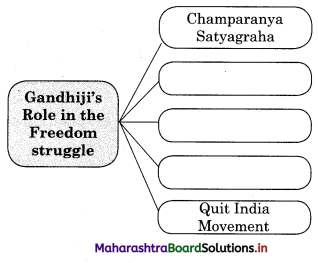
Answer:
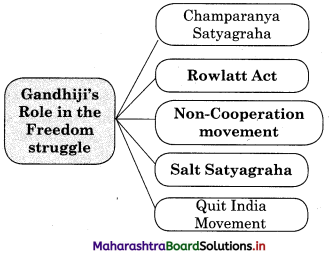
Question 4.

Answer:

4A. Write short notes.
Question 1.
Sedition Law.
Answer:
- On 25th November 1870, James Stephen added section 124(A) to the Indian Penal Code. It is known as ‘Sedition Law’.
- This law declared that any act leading to insurgencies such as using provocative words, writing, signs, or similar things against the British rule was a crime punishable with a fine or imprisonment or death sentence.
- ‘Bangvasi’, a weekly magazine was the first one to be charged for treason and tried under this law.
![]()
Question 2.
Vernacular Press Act of 1878.
Answer:
- On 14th March 1878, the Vernacular Press Act was implemented.
- This act was concerned with writing and printing articles that would lead to insurgence against the British Government or the creation of hatred among people on the basis of race, caste, and creed.
- By applying this law, the British Government had confiscated 210 Marathi books. Lokmanya Tilak, Shivrampant Paranjape, and Ganesh Damodar Savarkar were put under trial for sedition.
- ‘1857-The first war of Independence’ written by Swatantryaveer Savarkar was one of the confiscated books.
4B. Explain the following statements with reasons.
Question 1.
There was discontent among the soldiers in the Indian army which resulted in the freedom struggle of 1857.
Answer:
The freedom struggle of 1857 took place for the following reasons:
- The increasing discontent in the army was not just due to mounting pressures but also due to political, social, religious, and economic reasons.
- The treatment given to Indian soldiers and the restrictions imposed on them was the root cause of their discontent.
- The soldiers felt hurt because of many reasons such as cuts in their allowances, being compelled to cross the sea, frequent humiliation during the daily parade, partiality ruling large in matters of transfers, being left out during promotions, etc.
Question 2.
The Doctrine of Lapse was adopted by Lord Dalhousie.
Answer:
This policy was adopted by Lord Dalhousie.
- According to this policy, an adopted son (Dattak) was not allowed to succeed a deceased ruler of a princely state unless there was a pre-approval to such succession by the British Government.
- By implementing this policy, Lord Dalhousie annexed the states of Satara, Sambalpur, Jaitpur, Udaipur, Jhansi, and Nagpur.
- This policy created a lot of discontent among the rulers of princely states who were subjected to this policy.
- Annexation of the princely states put the soldiers in the army out of jobs.
- Along with annexing the states the British Government also seized inherited landholdings which had made a large number of Indians unhappy.
Question 3.
The ‘Queen’s Proclamation’ was announced after the revolt of 1857.
Answer:
Queen Victoria of England issued a charter known as the ‘Queen’s Proclamation’ on 1st November 1858. The following were the main provisions of the charter:
- Lord Canning was appointed as the first viceroy and Governor-General of India.
- The Indian princes were assured that their territories would not be annexed and they were given the right to adopt sons. Thus, the Doctrine of Lapse was withdrawn.
- The Indian princes were further assured that all the treaties which they had entered into with the East India Company would be honoured by the Crown.
- She further declared that all Indians were her subjects and no one would be discriminated on the basis of race, creed, caste and birthplace, employment on the basis of qualification and skills, no interference in religious matters, fulfillment of the agreements with the rulers of the princely states, etc.
![]()
Question 4.
The war of 1857 had a deep impact on Indian society.
Answer:
The following were the effects of the revolt of 1857:
- Provincial and communal loyalties were gradually replaced by a feeling of being united as a nation and national loyalty.
- It dawned on the Indian people that they cannot win in armed combat with the British and a need was felt to find more innovative methods to counter the British rule.
- Becoming aware of the united Indian people during the 1857 revolt, the British adopted a policy of ‘Divide and Rule.
Question 5.
The freedom struggle of 1857 was the result of mounting pressures.
Answer:
The freedom struggle of 1857 was the result of mounting pressures because of:
- Increasing discontent of Indian soldiers in the British army.
- Political social religious and economic reasons.
- Lord Dalhousie’s ‘Doctrine of Lapse’ on the civil front.
- Introduction of new land revenue systems like ‘Kayamdhara or Zamindari’ (permanent settlement) ‘Ryotwari’ and ‘Mahalwari’.
- Religious conversions of the British and British policies with regard to Indian customs and traditions contributed to the increasing discontent among the Indian people.
Question 6.
The differences between the Moderates and Extremists reached their climax in the Surat session in 1907.
Answer:
The Surat session in 1907 witnessed the split of the moderates and the extremists because the moderates wanted to avoid the resolution of ‘Swadeshi’ and ‘Boycott’. The Extremists wanted to stop these attempts of the moderates. This increased the tension during the session. Reconciliation became impossible ultimately the Indian National Congress split into two groups.
Question 7.
The Indian movements against British imperialism took many forms, one of them being the armed revolution.
Answer:
The armed revolution was one of the forms of Indian movements against the British. The main objective of the armed revolutionaries was to weaken the government administration to dispel the fear of the government in people’s minds and thus to uproot the British rule in India.
![]()
Question 8.
Parallel governments (Pratisarkar) were established in some parts of India.
Answer:
In 1942, in some parts of India, people were successful in uprooting British Governance. In Midnapur District (Bengal), Balia(U.P), and Bhagalpur, Purnia (Bihar) near Azamgarh the British officers were forced to leave their offices people took charge of the governance at these places. Krantisinha Nana Patil a revolutionist established Pratisarkar (Parallel government) in the Satara district of Maharashtra. He established ‘People’s Government’.
5. State your opinion.
Question 1.
The policy of Lokmanya Tilak is known as ‘Responsive Co-operation’.
Answer:
- The First World War had put the British in a difficult situation.
- Lokmanya Tilak proposed that it was the right time for Indians to take advantage of the situation resulted because of the war and ask for independence.
- The Governor of Bombay called a meeting of Indian leaders for help.
- Lokmanya Tilak in very clear terms told the British that the Indian soldiers would be sent to fight if only, the British Government promise ‘Swaraj’.
- This policy of Lokmanya Tilak is known as ‘Responsive Co-operation’.
6. Answer the following questions in detail.
Question 1.
Write a note on the land revenue system introduced in British India.
Answer:
- The British tried to introduce new land revenue systems like ‘Kayamdhara or Zamindari’ (permanent settlement), ‘Ryotwari’, and ‘Mahalwari’.
- These revenue systems were formed without any concern for the Indian tradition of revenue systems, the Indian cropping cycle, and the Indian climate.
- The new revenue systems introduced by the British made the common farmer penniless while making the Government and the landlords rich.
- Earlier, the farmer could pay land tax by way of food grains and other commodities but now he had to pay in hard cash.
- The farmer had to pay tax despite a good or bad harvest. Moreover, the farmer was driven to a dire condition if there was a famine.
- The farmer was thus caught between the Government and money lenders.
Question 2.
Write a note on the Hindustan Socialist Republican Association.
Answer:
- Bhagat Singh, Chandrashekhar Azad, Raj Guru, and Sukhdev established the Hindustan Socialist Republican Association in 1928 in Delhi.
- Their goal was to free India from British exploitation.
- They wanted to rip off the British system that exploited the farmers and labourers.
- Their organization had an independent department known as the ‘Hindustan Socialist Republican Army’ for collecting arms and executing their plans.
- Chandrashekhar Azad was the chief of that organisation.
- The members of this organisation had completed several adventurous tasks for instance Bhagat Singh and Rajguru avenged the death of Lala Lajpat Rai, Saunders was killed to teach a lesson to British officers.
![]()
Question 3.
Discuss the differences between the Moderates and Extremists.
Answer:
The moderates and extremists differed on the following grounds.
- The Extremist’s wing of thinkers insisted that independence should be the natural priority. An independent nation could provide the right set-up for social reformation on the other hand the moderates thought that without social reformation independence was incomplete. They did not mind appealing to the British Government to help in the task of social reforms.
- Gopal Ganesh Agarkar was at the helm of those who insisted on the priority of social reforms. He emphasized reforming oneself. Lokmanya Tilak, leader of the extremists wanted that the home being taken over by others should be recovered first, then only we can reform it.
- Pherozeshah Mehta, Gopal Krishna Gokhale were the leaders of the moderates. They felt that the British Government will not disappoint them if they could, convince the government about their grievances with necessary proofs Lokmanya Tilak on the other hand felt that the British Government will not yield to applications requests and speeches.
- The differences between Moderates and Extremists reached their climax in the Surat session of the Indian National Congress in 1907.
- The Moderates wanted to avoid the resolutions of ‘Swadeshi and Boycott’ while the extremists wanted to stop these attempts of the moderates.
- This increased the tension during the session. Reconciliation became impossible ultimately the Indian National Congress (INC) split into two groups.
7. Answer the following question with the help of the given points.
Question 1.
Discuss Gandhiji’s role in the following:
(a) Champaranya Satyagraha
(b) Rowlatt Act
(c) Non-Co-operation Movement
(d) Salt Satyagraha
(e) Quit India Movement
Answer:
(a) Champaranya Satyagraha (1917):
- After returning to India Gandhiji took up issues of farmers in Champaranya, Bihar in 1917.
- The British plant owners were pressing the farmers to cultivate only indigo. Not only that, they used to buy indigo at very low rates from the farmers.
- Gandhiji decided to protest against this exploitation and to relieve the farmers from their misery by doing satyagraha Gandhiji was successful in his efforts and the British banned the compulsion of cultivating indigo.
(b) Rowlatt Act (1919):
- The British Government formed a committee to suppress the national movement that was spreading rapidly.
- Sir Sydney Rowlatt, the British officer was the president of the committee.
- An act was passed in 1919 known as the Rowlatt Act by which the British Government had the authority to imprison any Indian without a warrant and to put them under trial without any inquiry.
- Mahatma Gandhiji decided to protest against this act through satyagraha.
- He appealed to all people to go for a mass protest on 6th April 1919 by closing down all daily transactions.
![]()
(c) Non Co-operation Movement (1920):
- In 1920, in the Nagpur session of the Indian National Congress, a resolution was passed to start the ‘Non-Co-operation Movement’ all over India.
- Mahatma Gandhiji was asked to lead the movement. It was decided to boycott all schools, colleges, legislative bodies, courts, government offices, and imported goods.
- Indian people responded to this call in a commendable way. Students participated in large numbers. Several lawyers stopped their practice and participated in the movement.
- Among them were C. R. Das, Motilal Nehru, M.R. Jaikar, and many other prominent figures.
- In many places clothes were publicly burnt. The farmers gave a tremendous response to Mahatma Gandhi’s appeal of Non-Co-operation. The working class also participated.
- A nationwide series of public strikes were started.
- ‘Charkha’ became the symbol of ‘Swarajya’ and ‘Swadeshi’ became a household term in India.
(d) Salt Satyagraha (1930):
- The British had levied a heavy tax on salt, an essential commodity in daily life. Mahatma Gandhi declared satyagraha to protest against this tax.
- On 12th March 1930, he began a march from his Sabarmati Ashram to Dandi on the Gujarat seacoast against this unjust tax.
- On 6th April on the sea coast at Dandi, he broke the British law of salt with a token act of collecting a handful of salt from there.
(e) Quit India Movement:
- On 8th August 1942, a resolution was passed in the INC session for the British to ‘Quit India’ and it was approved with a great majority. Under the leadership of Mahatma Gandhi, this movement took shape.
- This was the last important step in the struggle for India’s freedom. As a result, all the leaders clapped into jails.
- This agitation took a violent form and the British government perpetrated human atrocities on the people.
- But an awakening had taken place and the people were not prepared to remain under the British on any account.
- Mahatma Gandhi gave the mantra ‘Do or Die. His words created a new spirit among the Indians.

